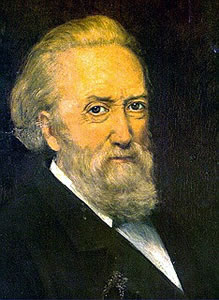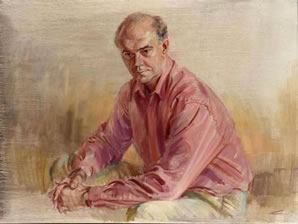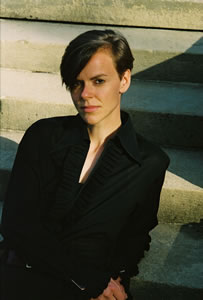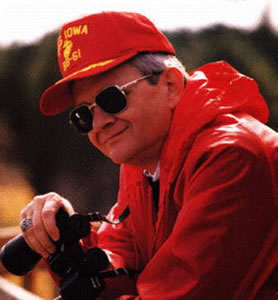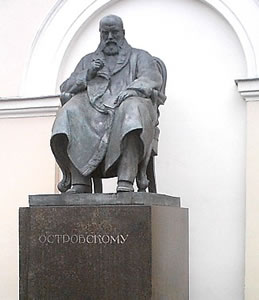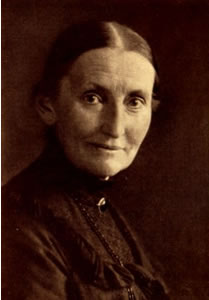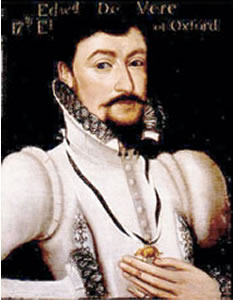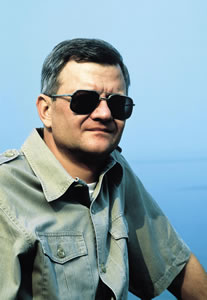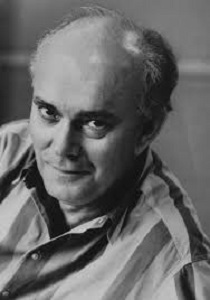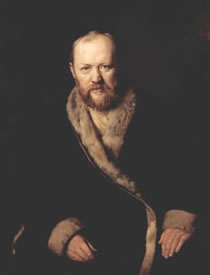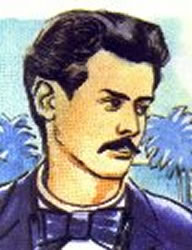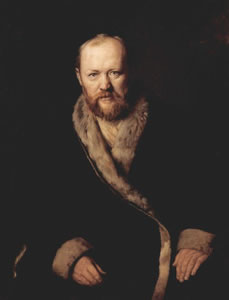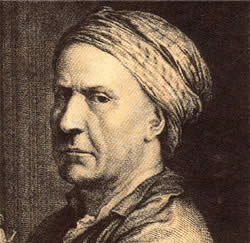De Duitse schrijfster Antje Rávic Strubel werd geboren op 12 april 1974 in Potsdam. Zie ook alle tags voor Antje Rávic Strubel op dit blog.
Uit: Snowed Under (Vertaald door Zaia Alexander)
“Tower over him. But they’re standing on a scaffold with nothing beneath them. And they keep staring downward. They get so scared, they can’t move. Erik M. Broda leans his head back. The leather headrest connects coolly to his neck, as if the chair had been molded to his head. The glass pane on the office door is turning black, ripple by ripple. Erik M. Broda tips his chair forward, slams the stamp on the card to Mainz, and sweeps it into the open carton next to the desk. “Domestic mail?” Simona always flings the door wide-open when she enters the room, as if she expected someone to bar her entry. She wears tight, gray, ankle-length skirts that force her to take tiny steps. But the sound emanating from her stiletto heels more than compensates for it. She’s the only one here, who wears long skirts and stilettos. They’re completely out of fashion. The waitresses and salesgirls across the street at the Potraviny wear skirts barely larger than a standard, medium-sized envelope and shiny flesh-colored stockings. “Still in the sorting machine.” “At the last staff meeting we agreed that domestic mail must be processed first because it’s business mail and business comes first. Weren’t you present?” The last button of her skirt is open. He can tell because she’s wearing a blouse over her skirt, and it leaves a small bulge at the hip. He knows exactly why she wants to get rid of the domestic mail first. “Sure, I was there. I thought the resolution wasn’t going to be enforced until next month. To give the employees a chance to adjust.” “Including you, there are four of us working here. And I don’t know of anyone, except for you, who needs a full month to remember that domestic mail needs to be processed before postcards.” “To be honest, Simona,” he says, pausing. “I don’t think much of your resolution.” “I don’t care what you think about it. It has been decided by majority vote. And you will please comply.” “Do you really believe it will make such a difference?” “It will make the distribution more efficient. If you didn’t pay so much attention to what your female colleagues are wearing, you’d have realized as much.” “Everything is dispatched at night. It makes no difference whether the letters are processed in the morning or at noon.” It’s getting warm in the room. He can take off his jacket now. “It makes the in-house dispatch more efficient.” “I thought it very efficient as it was.” “Erik, you heard me. In one hour I want the mail in the delivery room.”

Antje Rávic Strubel (Potsdam, 12 april 1974)
De Britse blijspelauteur Alan Ayckbourn werd geboren op 12 april 1939 in Londen. Zie ook alle tags voor Alan Ayckbourn op dit blog.
Uit: Confusions
“LUCY returns from the kitchen with a plate of biscuits
LUCY Here we are now. (Seeing Terry) Oh.
TERRY Evening.
LUCY Hallo.
ROSEMARY My husband.
LUCY Terry, isn’t it?
TERRY Yes.
LUCY That’s a nice name, isn’t it? (Pointing to the sofa) Sit down there then. Have you got your orange juice, Rosemary?
TERRY sits
ROSEMARY Yes, thank you. (She picks up the glass of orange juice and sits)
TERRY Orange juice?
ROSEMARY Yes.
TERRY What are you doing drinking that?
ROSEMARY I like orange juice.
LUCY Now, here’s some very special choccy bics but you mustn’t eat them all. I’m going to trust you. (She starts tidying up again)
ROSEMARY (still humouring her) Lovely. (She mouths “say something” to Terry)
TERRY Yes. Well, how are you keeping then—er, sorry, I’m forgetting. Lesley, isn’t it?
LUCY Mrs Compton.
TERRY Yes. Mrs Compton. How are you?
LUCY Very well, thank you, Terry. Nice of you to ask.”

Alan Ayckbourn (Londen, 12 april 1939)
Scene uit een opvoering in Windsor, 2016
De Amerikaanse schrijver en jurist Scott Turow werd geboren op 12 april 1949 in Chicago. Zie ook alle tags voor Scott Turow op dit blog.
Uit: Reversible Errors
“Look,” said Arthur, “our client, Gandolph. ‘Rommy’? Not only did Rommy confess early and often, but when he went to trial, his defense was insanity. Which requires his lawyer to admit Rommy committed the crime. Then we have ten more years of appeals, and post-conviction petitions, and habeas corpus proceedings, with two different sets of new attorneys, and none of them happens to mention that Rommy is the wrong man. Let alone Rommy, who only remembered that he didn’t do it when he was about forty-five days away from getting the needle. Really, Pamela. Do you think he told the lawyers before us he was innocent? Every con knows this game — new lawyers, new story.”
Arthur smiled, attempting to appear worldly-wise, but the truth was he’d never really accommodated himself to criminal defendants’ shenanigans. Since leaving the Prosecuting Attorney’s Office, Arthur had played defense lawyer infrequently, only when one of the firm’s corporate clients or its bosses was suspected of some financial manipulation. The law he lived most days as a civil litigator was a tidier, happier law, where both sides fudged and the issues raised were minuscule matters of economic policy. His years as a prosecutor seemed to be a time when he’d been assigned each day to clean out a flooded basement where coliform bacteria and sewer stink rotted almost everything. Someone had said that power corrupted. But the saying applied equally to evil. Evil corrupted. A single twisted act, some piece of gross psychopathology that went beyond the boundaries of what almost anybody else could envision — father who tossed his infant out a tenth-floor window; a former student who forced lye down the throat of a teacher; or someone like Arthur’s new client who not only killed but then sodomized one of the corpses — the backflow from such acts polluted everyone who came near. Cops. Prosecutors. Defense lawyers. Judges. No one in the face of these horrors reacted with the dispassion the law supposed. There was a single lesson: things fall apart. Arthur had harbored no desire to return to that realm where chaos was always imminent.”

Scott Turow (Chicago, 12 april 1949)
DVD-cover
De Amerikaanse schrijver Tom Clancy werd geboren op 12 april 1947 in Baltimore County, Maryland. Zie ook alle tags voor Tom Clancy op dit blog.
Uit: De tanden van de tijger (Vertaald door Hugo Kuipers)
“Hij was goed in het spionnenvak, zo goed dat hij momenteel chef van deMossad-post in Rome was, een belangrijke functie. Intussen had zijnneef Daniel ontslag uit de dienst genomen om in het familiebedrijf tegaan werken, waar hij meer kon verdienen dan bij de overheid. Davidhad zijn handen vol aan zijn werk in Rome. Hij had drie fulltime inlich-tingenagenten onder zijn bevel, en die verzamelden een grote hoeveel-heid informatie. Een deel van die informatie kwam van een agent die zeHassan noemden. Hij was Palestijns van afkomst en had goede connec-ties bij dePFLP, het Volksfront voor de Bevrijding van Palestina, en dedingen die hij daar te horen kreeg, deelde hij met zijn vijanden, voorgeld, genoeg geld om een comfortabele flat op een kilometer afstandvan het Italiaanse parlementsgebouw te kunnen betalen. David zou van-daag weer informatie van hem ophalen.Hij had al vaker gebruikgemaakt van deze locatie: de herentoiletten vanRistorante Giovanni bij de Spaanse Trappen. Hij nam eerst de tijd om telunchen met kalfsvlees Francese – dat was daar voortreffelijk – en slootde maaltijd af met witte wijn. Daarna stond hij op om zijn pakje te gaanhalen. De uitwisselingsplaats bevond zich aan de onderkant van hetmeest linkse urinoir, een theatrale keuze, die het voordeel had dat dieplaats nooit werd onderzocht of schoongemaakt. Er was daar een stalenplaatje vastgelijmd, en zelfs wanneer iemand het zag zitten zou het ervrij onschuldig uitzien, want op het plaatje was de naam van de fabri-kant aangebracht, samen met een getal dat helemaal niets te betekenenhad. Toen hij erheen ging, besloot hij van de gelegenheid gebruik temaken om te doen wat mannen meestal met een urinoir doen, en toenhij daarmee bezig was, hoorde hij de deur krakend opengaan. Degenedie binnenkwam sloeg blijkbaar geen acht op hem, maar voor alle ze-kerheid liet hij zijn pakje sigaretten vallen, en toen hij zich bukte omhet met zijn rechterhand op te rapen, haalde hij met zijn linkerhand vlughet magnetische pakje van zijn plaats. Dat was een staaltje van goed veld-werk. Net als een professionele goochelaar had hij met zijn ene hand deaandacht afgeleid en met zijn andere hand het eigenlijke werk gedaan.”

Tom Clancy (12 april 1947- 1 oktober 2013)
De Duitse schrijfster Agnes Sapper werd geboren op 12 april 1852 in München. Zie ook alle tags voor Agnes Sapper op dit blog.
Uit: Das kleine Dummerle
„In solchem Familienkreis geht es lebhaft zu und die Hausfrau findet oft kaum Zeit zum Essen, bis sie den Kindern vorgelegt hat, und es ist ein Glück, wenn für sie noch etwas auf der Platte bleibt, nachdem alle Teller voll sind. Sie sah auch ein wenig mager aus, die gute Frau Pfäffling, aber ihr Mann war auch nicht dicker, ebenso waren die drei Jungen lang aufgeschossen, die Zwillingsschwestern schmal und das jüngste, das Elschen, gar ein zartes Geschöpf. Nur der Frieder war rundlich und hatte frische rote Backen. Das Essen ging rasch vorüber, übrig blieb nichts, und es waren alle so gerade zur Not satt geworden. Vater Pfäffling nahm gleich wieder seine Karte vom Fichtelgebirge vor, breitete sie aus, und so viel Köpfe darüber Platz hatten, so viele steckten sich zusammen, um des Vaters Finger zu folgen, der den geplanten Reiseweg bezeichnete.
Es gibt nichts Schöneres, als so im Geist zu reisen: da geht alles so leicht und glatt, ohne Hindernis; und doch können auch die Reisen im Geist jäh unterbrochen werden – es klopfte jemand an der Türe, alle Köpfe hoben sich, der Hausherr trat ein.
Ein paar Reden wurden gewechselt über das Wetter und die bald beginnenden Ferien, und dann, ja dann kam es eben heraus, daß der Hausherr leider die Wohnung kündigen, und daß die Familie Pfäffling ausziehen müsse. Ein Verwandter wollte die Wohnung mieten und fast doppelt so viel Miete zahlen wie Herr Pfäffling, der ja die Wohnung halb umsonst gehabt habe; der Verwandte habe auch nur ein Kind, und da kämen nicht so fatale Sachen vor wie z. B. gestern, wo die jungen Pfäfflinge durch den Hof gesprungen seien und die Stangen umgestoßen hätten, die das Waschseil hielten, so daß die frischgewaschene Wäsche auf den Hof gefallen sei und die Hausfrau alles noch einmal habe waschen müssen.
»So etwas habt ihr getan, Kinder?« rief Vater Pfäffling und wandte sich nach den Angeschuldigten um; aber merkwürdigerweise standen bloß noch die Mädchen da, die Knaben hatten sich einer nach dem andern beim Erscheinen des Hausherrn hinausgedrückt. Doch nicht alle, Frieder, der kleine Dicke, stand noch beim Vater.“

Agnes Sapper (12 april 1852 – 19 maart 1929)
Cover
De Engelse hoveling, dichter en toneelschrijver Edward de Vere, 17e graaf van Oxford, werd geboren op 12 april 1550 in Castle Hedingham. Zie ook alle tags voor Edward de Vere op dit blog.
Love is a discord
Love is a discord and a strange divorce
Betwixt our sense and rest, by whose power,
As mad with reason, we admit that force
Which wit or labour never may divorce (?):
It is a will that brooketh no consent;
It would refuse yet never may repent.
Love’s a desire, which, for to wait a time,
Doth lose an age of years, and so doth pass
As doth the shadow sever’d from his prime;
Seeming as though it were, yet never was;
leaving behind naught but repentant thought
Of days ill spent of that which profits nought.
It’s now a peace and then a sudden war,
A hope consumed before it is conceived;
At hand it fears, and menaceth afar;
And he that gains is most of all deceived.
Love whets the dullest wits, his plagues be such,
But makes the wise by pleasing dote as much.

Edward de Vere (12 april 1550 – 24 juni 1604)
Borstbeeld door Paula Slater in de New Masters Gallery, Carmel, California
De Puertoricaanse dichter José Gautier Benítez werd geboren op 12 april 1848 in Caguas. Zie ook alle tags voor José Gautier Benítez op dit blog.
Pueto Rico (Fragment)
Three centuries have passed since humankind,
Secluded and confined in the Old World,
Dreamed not your name nor kept you well in mind.
Your being was the loveliest dream’s swirl
Among those saw beyond edges of the known
To far Thule’s fantastic coastline’s curl.
An hour then sounded when we heard that tone
By which the orb’s great clock marks vital news:
And the Atlantic parted its crested waves’ wild foam.
The fateful hand of destiny
Had touched a man on the impassioned brow,
And pointed him a way across the sea.
He wanted only, when he took to sails,
Crossing the regions of the Occident,
To return to that spot whence light first hails.
He hoisted sail into the winds of chance
From the far limit of a surf-tossed sea;
Good fortune pressing his caravels’ advance,
He stumbled on America’s shore lee.
You’re comely chip, my isle, of its contour.
Some lovely bit of earth, hurled high in air
By fearful cataclysm from the western shore
Fell to the sea to make this island fair.
Vertaald door W. K. Jones en Roberto Màrquez
José Gautier Benítez (12 april 1848 – 24 januari 1880)
Muurschildering bij de bibliotheek van Mayagüez
De Russische toneelschrijver Alexander Nikolajewitsj Ostrovski werd geboren op 12 april 1823 in Moskou. Zie ook alle tags voorAlexander Ostrovski op dit blog.
Uit: Sin And Sorrow Are Common To All
“PROKOFYEVNA. So, so. I recognized him just now. I used to see him as a youngster. He often rode to town with his mother, and they would call on me. Does he live in the country?
KARP. No, we are most of the time in St. Petersburg; but now we have come to the country to arrange business matters.
PROKOFYEVNA. So, so. But is he a good man to deal with?
KARP. Pretty good.
PROKOFYEVNA. Well, thank the Lord! May He reward him! What business brought you to our town? KARP. Oh, those endless legal matters. Petty business, something to bear witness to; but I suppose he’ll waste five days over it.
PROKOFYEVNA. It wouldn’t be surprising. Have you called on the judges?
KARP. Yes, we called on them all. Just now they sent us a clerk from court.
PROKOFYEVNA. They’ll probably do it quicker for you than for us. If you need anything, knock on the wall, and I’ll come. [Goes out. BABAYEV and SHISHGALEV enter at the side door.
SCENE II BABAYEV, SHISHGALEV, and KARP
BABAYEV. So you say, my dear sir, that it is absolutely impossible?
SHISHGALEV. [Bowing and continually blowing his nose and covering his mouth with his hand] But, believe me, sir, if it were at all possible we should have—
BABAYEV. Maybe it is possible?
SHISHGALEV. Judge for yourself, sir. Now the court session has ended, it is quite impossible to assemble the members; to-morrow is a holiday—then comes Saturday and then Sunday. BABAYEV. Just think, my dear sir, how you are treating
me!
SHISHGALEV. How am I to blame? I’m the humblest sort of man.”

Alexander Ostrovski (12 april 1823 – 14 juni 1886)
De Franse schrijver Guillaume-Thomas Raynal (Abbé Raynal ) werd geboren op 12 april 1713 in Lapanouse de Séverac. Zie ook alle tags voor Guillaume-Thomas Raynal op dit blog.
Uit: L’Histoire des deux Indes
« D’où naît cette étonnante contradiction? De ce que nous sommes fous dans la manière dont nous en usons avec nos colons , et ‘inhumains et fous dans notre conduite avec nos paysans, puisque nous vou-lons la chose de près et de loin, et que ni’de près ni de loin nous n’en voulons les moyens. Mais comment arrive- t-il que cette inconsé-quence des peuples soit aussi le vice des gouver-nernws? C’est qu’il y a , selon toute apparence, plus drjalousie que de véritable intérêt , soit dans l’acquisition , soit dans la conservation de cette espèce de propriété lointaine ; c’est que les sou-verains ne comptent guère les colons au nombre de leurs sujets. Le dirai-je ? Oui, je le dirai , puis-que je le pense : c’est qu’une invasion de la mer qui engloutirait cette portion de leur domaine les affecterait moins que la perte qu’ils en feraient par l’invasion d’une puissance rivale. Il leur im-porte peu que ces hommes vivent ou meurent , pourvu qu’ils n’appartiennent pas à un autre. Je m’adreterai donc d’abord aux souverains , et je leur dirai : Ou abandonnez ces hommes à leur sort, ou secourez-les; ensuite aux colons , et je leur dirai: Implorez l’assistance de la métropole à laquelle vous êtes soumis ; et si vous en éprouvez un refus, rompez avec elle. C’est trop d’avoir à supporter à la fois la misère, l’indiffé-rence et l’esclavage. Mais pourquoi les colonies sont-elles et plus mal administrées et plus malheureuses encore sous les puissances à la force et à la splendeur desquelles elles sont le plus nécessaires? C’est que ces puissances sont encore plus folles que nous. C’est que, plus commerçantes, l’esprit de l’administration est encore plus cruel. C’est que, semblables au fermier qui n’est pas sûr de jouir d’un nouveau bail , elles épuisent une-terre qui peut d’une année à l’autre passer entre les mains d’un nouveau possesseur. Lorsque les provinces d’un état sont contiguës, les plus voisines de la frontière sont les plus ménagées. C’est tout le contraire pour les colonies. Qn les vexe parla seule crainte que dans une circonstance périlleuse le ména-gement qu’on aurait eu pour elles ne fût en pulse perte. Que ces réflexions soient justes ou ne le soient pas ;toujours sera-t-il vrai aux yeux des hommes éclairés que l’établissement qui vient de nous oc-cuper est bien éloigné de la prospérité qui lui était destinée. »
Guillaume-Thomas Raynal (12 april 1713 – 6 maart 1796)
Borstbeeld in de Académie des Sciences, Belles-Lettres et Arts de Lyon












